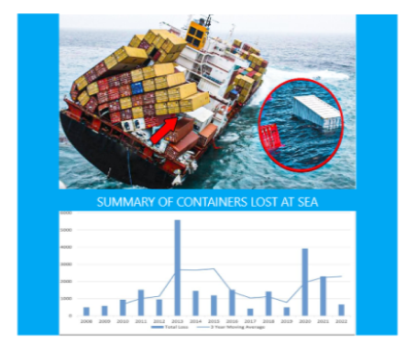The World Shipping Council (WSC)’s annual report for 2023 on containers lost at sea revealed a positive trend in container safety. The WSC Containers Lost at Sea Report – 2023 Update shows that last year (2022), ‘only’ 661 containers were lost overboard. They have been issuing these reports since 2008 and during that 15-year period, on average 1,566 containers were lost at sea each year.
It is thought that the average shipping container represents about us$50,000 in value, meaning that each year there are millions of dollars lost at sea. Still, the figure of 661 represents less than one thousandth of 1% (0.00048%) of the 250 million containers currently shipped each year, with cargo transported valued at a total of more than US$7 trillion.
Various international authorities have drawn up graphs to represent the annual trends. The one we have incorporated into our image (above) shows a spike in 2013, which was mainly due to a monumental shipping disaster when the MOL Comfort broke in two and sank with its entire cargo of 4,293 containers into the Indian Ocean.
Another smaller spike shows for 2020/21 – that was because of five incidents during a span of just two-months. The bulk of the more than 2,675 containers lost in that time came from two ships that encountered bad weather in the North Pacific. The first, a vessel named One Apus, lost 1,816 containers as it sailed into a storm about 1,600 nautical miles northwest of Hawaii in Nov 2020. It was followed by the Maersk Essen losing 750 containers on its way from Xiamen, China, to the Port of Los Angeles in January 2021.
Our readers may recall a significant episode here in Australia when forty shipping containers fell overboard off the NSW coast from the vessel APL England as it was sailing from China to Melbourne in wild weather in May 2020.
More recently, we reported on the 600 containers that fell into the ocean after the containership Angel sank while anchored off Kaohsiung port, Taiwan. Some were recovered, while many remained unaccounted for.
Containers that fall off ships don’t always sink. Most of them float. Unfortunately, when they do, they often float just below the surface of the water, which means they aren’t visible to other vessels in the area. It is estimated that a 20’ container will float for up to 57 days, while a 40’ one will sink after around 171 days. Reefers are naturally tighter than general freight containers, so are usually buoyant until they break up. Sea conditions and waves will determine how long it takes for them to sink.
Last year, the International Maritime Organization (IMO) agreed on proposals for the mandatory reporting of lost containers. The new treaties will require vessels to report the loss of freight containers without delay to ships in the vicinity, and to the nearest coastal state and flag state. The draft amendments are expected to enter into force on 01 January 2026.
“Shipowners will be required to trace container losses at sea in order to recover them. It is no longer acceptable that a vessel can easily lose containers which are a danger to navigation and a threat to the environment,” says Régis Broudin, Global Head of Marine Claims at Allianz in a recent article on cargo risk.
WSC started the ‘MARIN Top Tier project’ to deliver concrete data on the causes of containers overboard and how to prevent further incidents. Top Tier’s research is currently taking place into container and lashing gear strength, stowage planning and optimization, guidelines for vessel operations, and voyage planning. During 2022, most WSC member carriers saw no or single digit container losses, with only two carriers reporting losses above 100 units for the year.
We always recommend that importers and exporters are covered for marine insurance on their freight. Even if your own cargo is not directly affected, damage to a ship can give rise to the declaration of a ‘General Average’ by the shipowner, with uninsured consignment holders needing to post bonds before release of their goods.
As licensed Customs Brokers and International Freight Forwarders, Colless Young professionally handles all your sea cargo consignments, containerised and general. We provide import and export shipping, as well as airfreight, including customs and quarantine clearance, fumigation treatment, warehousing and trucking. We are based in Brisbane and offer a complete range of logistics services through all Australian ports and airports.

